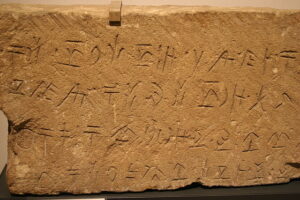Globalization is a significant force influencing cultures and societies across the globe; however, its effects on indigenous cultures, including cultural homogenization and language loss, can be profound and often detrimental.
This examination underscores the challenges encountered by indigenous writing systems, including language loss, linguistic imperialism, and the encroachment of dominant writing systems.
Efforts are underway to preserve and revitalize indigenous languages and scripts, highlighting the critical roles of collaboration, digital technology, and education in safeguarding these essential components of cultural identity and linguistic diversity.
This initiative seeks to reveal the rich tapestry of indigenous writing systems and the ongoing efforts to protect them in an increasingly interconnected world, emphasizing the importance of cultural preservation and indigenous resistance.
What is Globalization?
.jpg_00.jpeg)
Globalization is a complex process that transcends geographical and cultural boundaries, facilitating the movement of goods, services, individuals, and ideas on a global scale, impacting cultural identity and communication barriers. This phenomenon has significant implications for various aspects of society, including economic development, cultural exchange, transnationalism, and the formation of identity, often influencing identity politics and cultural narratives.
It is characterized by an increased interconnectedness among nations, which creates both opportunities and challenges, particularly concerning indigenous cultures, their heritage, and cultural adaptation. As globalization influences socio-economic dynamics, it also impacts communication systems, cultural narratives, and identity politics, leading to a range of outcomes for marginalized communities, including challenges in cultural sensitivity and communication barriers.
Understanding globalization is essential for addressing its effects on cultural dynamics, language policy, and the preservation of linguistic diversity.
How has Globalization Affected Indigenous Cultures?
The effects of globalization on indigenous cultures have been significant and frequently detrimental, leading to the erosion of cultural identities, traditional practices, and the further marginalization of minority languages. As dominant cultures exert their influence, many indigenous communities encounter challenges such as cultural imperialism, language shift, and the loss of heritage language.
This phenomenon can result in language extinction, the marginalization of traditional knowledge and indigenous knowledge, thereby undermining their rights and cultural sovereignty. However, globalization also offers opportunities for cultural resilience, decolonization, and the emergence of narrative styles as indigenous peoples strive to affirm their identities within a global context.
As individuals from these communities navigate a rapidly evolving world, they face the dual pressures of assimilation and the imperative to preserve their heritage, engaging in language activism and cultural storytelling. Initiatives aimed at reviving traditional languages and language maintenance often arise in response to the encroachments of globalization, reflecting a strong commitment to cultural continuity and linguistic revival.
Indigenous rights movements are gaining traction, utilizing global platforms to advocate for their recognition and protection, fostering community resilience and social justice. Despite the challenges posed by cultural homogenization, many indigenous groups are harnessing digital technology and social media to share their narratives, thereby fostering global awareness while reinforcing their local identities and global citizenship.
This dynamic interplay underscores both the challenges and innovative responses, such as digital preservation and cross-cultural communication, as these communities endeavor to maintain their unique cultural tapestries in the face of globalization’s forces.
What are Indigenous Writing Systems?
Indigenous writing systems consist of the distinct scripts and symbols created by indigenous communities globally to articulate their languages, cultural narratives, and traditional knowledge. These systems are essential for the preservation of linguistic diversity and play a significant role in reinforcing cultural identity among marginalized groups.
Through the documentation of languages and the analysis of these writing systems, linguistic anthropology illuminates the storytelling traditions, semiotics, and cultural transmission that form the foundation of indigenous communication. The importance of these writing systems extends beyond their linguistic value; they also serve to transmit heritage, indigenous knowledge, and collective memory across generations.
Examples of Indigenous Writing Systems
Indigenous writing systems, such as the Cherokee syllabary developed by Sequoyah and the Inuktitut syllabics utilized by Inuit peoples in Canada, exemplify the linguistic heritage, narrative techniques, and cultural practices inherent to these communities. These systems serve not only as tools for written communication but also as embodiments of the collective identity, historical narratives, and cultural landscapes of their respective cultures.
For instance, Maya hieroglyphs represent a sophisticated method for documenting historical events, rituals, and astronomical information, thereby highlighting the intricate relationship between language, spirituality, and cultural storytelling within Maya civilization. Similarly, the development of the Latin alphabet by the Sámi peoples underscores the significance of written expression in preserving their nomadic traditions, heritage preservation, and cultural identity.
By revitalizing these writing systems, indigenous communities affirm their linguistic rights, engage in language documentation, and cultivate pride in their heritage, ensuring that future generations possess a profound understanding of their cultural narratives and identity expression.
Therefore, recognizing the importance of these languages fosters not only linguistic diversity but also enriches the global tapestry of human experience and cultural dialogue.
The Impact of Globalization on Indigenous Writing Systems
The impact of globalization on indigenous writing systems has resulted in considerable challenges, including linguistic imperialism, cultural appropriation, and cultural assimilation, which pose a threat to the survival of these distinctive forms of expression.
As dominant global languages increasingly permeate various facets of life, numerous indigenous languages and their writing systems are at risk of language shift, communication barriers, and extinction. This phenomenon underscores the significance of writing culture as a vital component of cultural identity, community empowerment, and resilience, emphasizing the necessity for targeted initiatives, including educational initiatives, to preserve these systems in the face of globalization’s pressures.
Loss of Language and Cultural Identity
.jpg_01.jpeg)
The loss of language resulting from globalization presents a significant threat to cultural identity, as language serves as a fundamental component of heritage and community empowerment. The extinction of indigenous languages places the associated cultural practices, linguistic heritage, and knowledge systems at risk, resulting in a homogenization of culture and representation.
It is essential to address these challenges to promote social justice, cultural preservation, and language maintenance, ensuring that marginalized communities retain their unique identities in an increasingly globalized world.
The implications of language loss extend beyond mere vocabulary; they impact the core of how communities perceive themselves, their ethnic studies, and their place within the broader context. As indigenous languages diminish, traditional stories, rituals, and wisdom that have been transmitted through generations also fade, affecting intergenerational transmission and cultural narratives. This erosion endangers not only individual identities but also the rich diversity, adaptability, and cultural continuity that enhances the human experience.
Consequently, it is imperative for policymakers, educators, and society as a whole to actively support language revitalization initiatives, recognizing that the survival of these languages can contribute to a more inclusive and equitable society, enhancing cultural sensitivity and social justice.
Protecting linguistic heritage is crucial, as it directly influences social justice efforts aimed at community empowerment, elevating marginalized voices and acknowledging their histories.
Adoption of Dominant Writing Systems
The adoption of dominant writing systems frequently results in the marginalization of indigenous writing systems, as communities may experience pressure to conform to global communication standards, impacting cultural dialogue and educational access. This phenomenon, often referred to as linguistic imperialism, impacts the manner in which indigenous peoples express their identities and contributes to a gradual loss of traditional knowledge, cultural landscapes, and historical writing systems that are integral to their native scripts.
The repercussions of cultural assimilation manifest in various ways, affecting identity formation, narrative techniques, and the continuity of cultural practices.
When communities are compelled to adopt these dominant writing systems, they often forfeit access to their rich linguistic heritage, which encompasses unique expressions, metaphors, and distinct worldviews, limiting their cultural storytelling. The effects extend beyond individual loss, inhibiting meaningful dialogue within the community, cultural transmission, and leading to fractured intergenerational relationships.
As individuals navigate this pressure, they may internalize the belief that their language and culture are inferior, which can diminish their sense of belonging, identity expression, and self-worth.
This erosion of cultural identity poses a significant threat to the survival of vibrant traditions, multilingualism, and restricts the diversity of thought and expression that enriches the human experience.
Disruption of Oral Traditions
The disruption of oral traditions due to globalization poses a significant threat to the preservation of storytelling practices, transnationalism, and narrative styles that are essential for the cultural resilience of indigenous communities. As written forms of communication become increasingly dominant, the rich oral narratives that convey values, beliefs, and collective memory are at risk of being diminished, affecting cultural transmission and language evolution.
Protecting these oral traditions is not merely an issue of linguistic heritage; it is also a critical element of asserting language rights, cultural identity, and social impact.
These narratives, often transmitted across generations, serve as a living repository of knowledge that shapes identity, historical context, and fosters a sense of belonging among community members. In numerous indigenous cultures, storytelling transcends entertainment; it functions as a means of imparting history, ethics, and communal values, thereby reinforcing community engagement, solidarity, and resilience in the face of external challenges.
When these traditions are preserved, they give the power to communities to reclaim their voices and perspectives in a world where dominant narratives frequently marginalize them. This is a form of cultural preservation that helps maintain cultural identity. By advocating for the preservation of oral histories, society acknowledges the invaluable contributions of indigenous knowledge systems and traditional knowledge to humanity’s collective wisdom.
Challenges in Preserving Indigenous Writing Systems
The challenges associated with preserving indigenous writing systems in the context of globalization are complex and multifaceted. These challenges encompass issues such as limited resources, societal neglect, cultural appropriation, and the dominance of global languages.
As communities endeavor to revitalize their writing systems, they face obstacles related to language documentation, education, and community engagement. However, these challenges also provide opportunities for cultural innovation and the enhancement of community narratives, as indigenous peoples seek to assert their identities, heritage, and linguistic rights.
In a rapidly evolving world where major languages frequently overshadow native tongues, the imperative to maintain these unique writing systems becomes increasingly critical to combat language loss. Communities are not only striving to educate younger generations about their ancestral scripts but are also exploring innovative methods to integrate these languages into modern digital technology and social media.
By utilizing these platforms, they can reach wider audiences and promote greater appreciation for their cultural narratives. Collaborative efforts with linguists and activists can significantly increase the visibility of these languages, ensuring that they are not merely preserved as relics of the past but are dynamically interwoven into the contemporary discourse of cultural identity and expression. This process highlights the social impact and cultural adaptation that is critical for the survival of these languages.
Efforts to Preserve and Revitalize Indigenous Writing Systems
Efforts to preserve and revitalize indigenous writing systems are increasingly gaining traction as communities acknowledge the significance of maintaining their linguistic heritage amidst the challenges posed by globalization effects and language shift.
Numerous initiatives emphasize community empowerment and employ language revitalization strategies that integrate digital media and educational programs, supporting linguistic diversity and cultural dialogue.
By formulating cultural policies that promote the documentation, instruction, and advocacy of indigenous writing systems, these initiatives aspire to cultivate a sense of pride and identity within indigenous populations.
Collaborations with Indigenous Communities
.jpg_10.jpeg)
Collaborations with indigenous communities are crucial for the effective preservation and revitalization of indigenous writing systems, promoting a sense of ownership and agency among community members. These partnerships often facilitate the sharing of community narratives and cultural exchanges, enabling indigenous peoples to assert their language rights in a supportive environment. This interaction is vital for cross-cultural communication and understanding.
By working alongside linguists, educators, and cultural organizations, indigenous communities can leverage resources and expertise to enhance the visibility and relevance of their writing systems. This collaboration supports the broader goals of cultural continuity and community resilience.
Such initiatives not only aid in documenting and teaching these unique writing systems but also play a vital role in strengthening the identity and continuity of the culture itself. Engaging in this collaborative process enables indigenous groups to reclaim their linguistic heritage while fostering interest and understanding within the broader society.
Through workshops, storytelling sessions, and the co-creation of educational materials, the dialogue between communities and external partners enriches the cultural tapestry and expands perspectives on the significance of safeguarding linguistic diversity as a human right. This exchange ultimately cultivates mutual respect and deepens connections, potentially leading to more inclusive cultural policies and practices. Such efforts are part of the broader movement towards social justice and cultural sensitivity in global society.
Technology and Digital Preservation
Technology and digital preservation are vital in safeguarding indigenous writing systems, offering innovative tools and platforms for documentation and dissemination. By leveraging digital media, indigenous communities can share their linguistic heritage with a global audience, thereby fostering cultural innovation and revitalization efforts. This approach helps in tackling issues of linguistic imperialism and ensures that indigenous voices are heard in the global discourse.
These technological advancements not only facilitate language documentation but also empower communities to engage with their heritage in dynamic and interactive ways. The use of technology adoption in this field has proven to be a significant factor in community empowerment and cultural storytelling.
Such advancements support the creation of online archives, mobile applications, and social media campaigns that raise awareness of endangered languages and their unique scripts. With these resources, younger generations can learn about and engage with their cultural narratives and heritage language within a modern context, effectively bridging the gap between tradition and innovation.
Collaborative platforms enable indigenous writers and linguists to produce multimedia resources, ensuring that language education remains accessible and engaging. These efforts are crucial for the intergenerational transmission of language and cultural landscapes, which are integral to the preservation of linguistic heritage.
In essence, technology not only preserves these vital writing systems but also stimulates renewed interest and pride in cultural identities, reflecting the resilience and adaptability of indigenous communities in the digital age. This resilience is essential for maintaining cultural landscapes and addressing challenges posed by globalization trends.
Education and Advocacy
Education and advocacy play a critical role in the revitalization of indigenous writing systems, equipping communities with the necessary knowledge and skills to assert their linguistic rights and cultural identities. These efforts are crucial in combating cultural homogenization and supporting linguistic revival.
By providing access to resources and trained educators who recognize the significance of these writing systems, individuals are able to engage meaningfully with their ancestral languages. This engagement not only improves their communication skills but also reinforces their cultural connections, enabling them to preserve and transmit traditional knowledge to future generations. It also plays a significant role in identity formation and community engagement.
Advocacy efforts are essential to ensure the implementation of appropriate cultural policies that reflect the needs and aspirations of indigenous peoples. Such initiatives empower communities by equipping them with the tools to address contemporary challenges while maintaining a strong connection to their rich linguistic heritage, ultimately fostering resilience and pride in their cultural identity. These efforts are crucial in addressing communication barriers and supporting indigenous resistance against cultural and linguistic erasure.
Frequently Asked Questions
What is globalization and how does it impact indigenous writing systems?
Globalization refers to the process of increased interconnectedness and interdependence between countries and cultures, known as globalization trends. It has led to the spread of dominant languages and writing systems, often resulting in the erosion of indigenous writing systems and languages, a phenomenon linked to linguistic imperialism and cultural homogenization.
How has globalization affected the use of indigenous writing systems?
.jpg_11.jpeg)
The dominance of western languages and writing systems in the globalized world has led to a decline in the use of indigenous writing systems. This shift is often driven by economic factors and the global market. Many indigenous communities have adopted dominant languages and writing systems in order to participate in the global economy, which has impacted their cultural transmission.
What are some of the challenges faced by indigenous writing systems in the face of globalization?
Globalization has brought about challenges such as the lack of resources and support for the preservation and promotion of indigenous writing systems, as well as the perception that these systems are inferior to dominant ones. This has significant implications for identity politics and cultural appropriation.
How does the loss of indigenous writing systems impact indigenous cultures?
Writing systems are closely tied to cultural identity and play a crucial role in preserving traditional knowledge and practices. The loss of indigenous writing systems can lead to the erosion of indigenous cultures and their unique ways of life, impacting cultural continuity and heritage preservation.
Is there any effort being made to preserve and promote indigenous writing systems in the face of globalization?
Yes, there are various initiatives and organizations working towards the preservation and promotion of indigenous writing systems. This includes efforts to document and revitalize these systems, as well as advocating for their recognition and use in education and official contexts. These initiatives are often supported by indigenous authors and language activists who emphasize the importance of cultural exchange and representation.
What can individuals do to support the preservation and promotion of indigenous writing systems?
Individuals can support efforts to preserve and promote indigenous writing systems by learning about and respecting these systems, supporting indigenous-led initiatives, and advocating for the recognition and use of these systems in various contexts. Engaging with cultural storytelling and digital narratives can also play a role in reinforcing their significance within the global culture.

My name is Bruno, I have been a writer for 5 years and I work with website creation. My goal is to provide true information to readers. In fact, on this site I write about cultures and traditions, which I have been passionate about since childhood.




